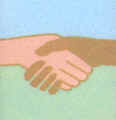
Missionary & Cultural Terms

Monoculture
I once heard a missionary-to-be say, I just want to go and evangelize, why do I need to know about culture? All I need to know is the Gospel and the Bible! That comment demonstrated a certain degree of ignorance on his part for people and cultures and it is a prime example of someone who speaks from an ethnocentric, monocultural mind-set. Even the New Testament was set in a specific time frame with Middle-Eastern Palestinian culture. As we try to truly understand the Scriptures and its applications, we need to interpret it from the Biblical cultural perspective of the time. If we truly love the people we are trying to reach with the love of Christ, we need to know their worldviews, beliefs, values, and behaviors. All these stems from their culture!
Subcultures
In North America, the local born Chinese struggles with the identity of being called Chinese or Canadian Chinese or Chinese American. With overseasí Chinese, one automatically subcategorized oneself into Chinese from Hong Kong or Taiwanese or Mainland Chinese. Recently I find out the Koreans categorized the Han-Chinese from the Chaoxian (Korean) Chinese. All these groups possess a subculture within the Chinese culture. Yes, we are all Chinese, but canít you see we think and act differently due to our cultural upbringings?
Cross-culture
Cultural awareness is more than just realizing another culture is different from ours. It is learning to value that other culture. Professor Howard Culbertson, Southern Nazarene University, listed several steps toward cross-cultural understanding:
1. Point of departure: "There's no one else here"
- Mind-set: Blind
2. "Our way is the only right way."
- Mind-set: Ethnocentrism
- Different means deficient
3. "Wait a minute, there may be another way."
- Mind-set: Willingness to crack open the door
- Awareness creates some sensitivity to cultural lenses
4. "Oh, you mean there are reasons why people respond differently."
- Mind-set: Tolerance
- Discernment gives birth to understanding
5. "It's OK to be different."
- Mind-set: Favorable acceptance
- Respect for cultural differences
6. " Multicultural living can enhance our lives and even be fun."
- Mind-set: Appreciation and admiration
- Esteem
Multiculture
A missionary often lives in a multicultural setting. Which means he or she has to maintain their natural culture or the ethnic way of doing and seeing things, yet cross over to the host country culture and people they are trying to reach with the love of Christ. A missionary needs to gain a certain understanding of this adopted culture in order to communicate the true meaning of love where the people of a different culture can understand, appreciate, and accept. Diane Ravitch identifies the two main currents of multiculturalism as pluralistic and particularist. Pluralistic views each culture or subculture in a society as contributing unique and valuable cultural aspects to the whole culture ("melting pot"). Particularist is more concerned with preserving the distinctions between cultures.
Transculture
The longer a missionary serves and lives in that host country, the more merging and converging of the cultures he or she has to deal with everyday. Thus transculture comes to being; thatís when a multiplicity of cultures mingle together to form a new mixed culture. Cultural terms are very complex yet very important, because if we are to be effective servants of the Lord, we need to be aware of how different cultures affect oneís behavior, which directly relate to how one makes decisions, which is based upon oneís belief and value systems.